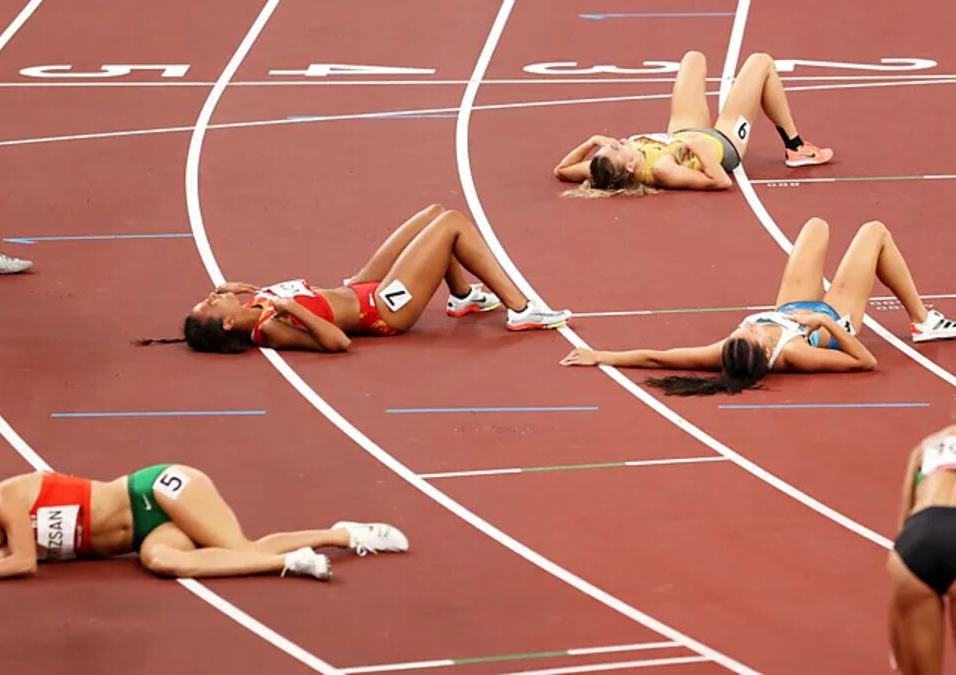Olympian-quality sleep tips

SIGN UP FOR YOUR FREE DAY PASS TODAY!
The extraordinary feats of Olympic athletes often stem from years of rigorous training and preparation.
Yet, one crucial element that frequently goes unnoticed is their sleep habits. Many athletes struggle to get the rest they need.
For instance, Irish artistic gymnast Rhys McClenaghan woke at 4:30 AM on the day he flew to the Tokyo 2021 Summer Olympics to squeeze in a training session.
His aim was to tire himself out enough to defeat jet lag by sleeping for only half of the 16-hour flight.
By doing so, he hoped his body would adjust to Tokyo's time zone, which is eight hours ahead of Dublin.
McClenaghan once shared on YouTube that his coach believes he should be roused in the middle of the night and still perform his routine flawlessly.
This readiness to perform despite sleep deprivation is part of the preparation for such a historic sporting event.
Olympic athletes often endure many years of intense exercise routines to compete at the highest level.
Despite this, sleep remains an essential yet frequently overlooked factor in their performance at the Games. It's widely acknowledged that sleep is critical for both mental and physical health, and inadequate rest can lead to detrimental effects.
In elite sports, where even a slight time improvement or precision adjustment can be the difference between victory and defeat, sleep quality is paramount.
For example, at the 2008 Beijing Olympics, a 1% performance boost could have secured gold medals for those who finished fourth in women's 400m swim and track events, as well as the women's road race.
The fourth-place sprinter in the men's 100m would have claimed silver with such an improvement.
Scientific research consistently shows how insufficient sleep negatively impacts athletes' performance.
Many elite athletes integrate sleep into their training regimens as a crucial component of competition preparation. Gabby Thomas, a U.S. Olympic gold medalist, credits prioritizing sleep for her success as a top runner.
The British Cycling team, during the 2008 Beijing Olympics, even brought their own pillows and mattresses to ensure consistent sleep, contributing to their significant medal haul.
A Stanford University study found that extending sleep to at least 10 hours per night improved sprint times, shooting accuracy, and reduced fatigue among college basketball players.
These findings underscore that sleep is as vital as training and nutrition.
Other research indicates that athletes restricted to four hours of sleep per night for three consecutive nights showed decreased joint coordination and were unable to jump as high compared to when they had over seven hours of sleep.
For ultramarathon competitors, the amount of sleep in the days leading up to a race accounted for about one-third of performance variability.
Matthew Crawley, a strength and conditioning coach and sport scientist, highlights that sleep is foundational for recovery and physiological processes like human growth hormone release and emotional regulation.
For elite athletes, sleep enhances concentration, mental state, recovery, and reduces injury risk.
However, many Olympic athletes get less than the recommended eight hours, particularly before competitions.
Sleep disturbances affect 50-78% of elite athletes, with 22-26% experiencing severe issues. Factors include early and late training sessions, unfamiliar sleeping environments, timezone changes, and performance-related stress.
Lack of sleep affects athletes' reaction times, accuracy, strength, endurance, and cognitive functions like decision-making.
These effects vary based on the sport; for instance, archery is more affected by fine motor skills, while a 100m sprint would see impacts on speed, power, and endurance.
Although there's limited research on how specific sports influence sleep, one study suggested individual athletes tend to sleep less than those in team sports, potentially due to differing training demands.
The timing of exercise also plays a role. Some people—morning larks—perform better early in the day, while night owls peak later.
This is tied to our circadian rhythm, a cycle influenced by external cues like light and activity. Studies have shown that athletes' performance varies with their circadian rhythm.
Understanding these patterns could optimize training and performance.
Technology is changing how sleep is analyzed. Wearable devices provide concrete data on sleep quality and duration, aiding athletes in improving sleep hygiene.
However, some athletes may find these metrics stressful, particularly before competitions.
To maintain a healthy sleep routine, athletes are encouraged to establish sleep hygiene practices such as maintaining consistent wake times, creating bedtime routines, limiting caffeine, and avoiding blue light exposure.
Innovations like "sleep banking" and strategic napping also offer performance benefits, helping athletes cope with sleep disruptions.
In summary, while Olympic athletes dedicate years to physical training, integrating effective sleep strategies is equally vital to achieve peak performance.
Source: bbc
The opinions shared in the GymNation blog articles are solely those of the respective authors and may not represent the perspectives of GymNation or any member of the GymNation team.
GET YOUR FREE TRIAL TODAY














































































